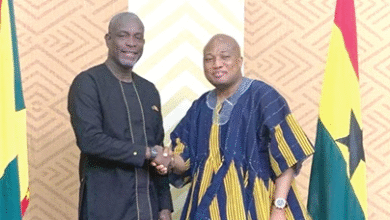Okyere Baafi to Mahama: Prioritise AfCFTA, Not China’s Zero-Tariff Offer

Member of Parliament for New Juaben South and Ranking Member on the Trade and Industry Committee, Michael Okyere Baafi, has urged government to focus on maximising the opportunities under the African Continental Free Trade Area (AfCFTA) rather than pursuing a zero-tariff trade agreement with China.
According to the lawmaker, Ghana’s economic future lies in strengthening intra-African trade, not in deepening dependency on major external economies whose trade arrangements often tilt in their favour.
Mr. Okyere Baafi’s comments follow President John Dramani Mahama’s announcement at the 2025 China–Africa Summit, where he revealed that Ghana was preparing to sign a zero-tariff access agreement with China by the end of October 2025. The deal, once finalised, would allow Ghanaian products to enter the Chinese market duty-free.
However, the New Juaben South MP cautioned that such an agreement, though appealing on the surface, could have long-term economic implications that might not benefit Ghana.
“Ghana does not necessarily need a zero-tariff arrangement with China. What we need is to expand trade within Africa under the AfCFTA framework, which already unites 54 out of 55 African countries,” Mr. Okyere Baafi stated.
He explained that while the zero-tariff offer might open a larger market, it risks widening the trade imbalance between Ghana and China. He cited trade data indicating that China’s exports to Ghana surged by 46% between 2020 and 2024, while Ghana’s exports to China increased by only 11% within the same period.
“If the trend continues, such agreements will only make Ghana more of a consumer economy for Chinese goods rather than a competitive exporter,” he added.
The Ranking Member, who previously served as Deputy Minister of Trade and Industry under the Akufo-Addo administration, further argued that leveraging AfCFTA presents a more sustainable and inclusive path to industrial growth.
He noted that trading within Africa would boost value addition, create jobs, and strengthen local manufacturing, as African countries share similar production structures and face fewer non-tariff barriers compared to Asian or Western markets.
“AfCFTA is Africa’s gateway to economic independence. By trading among ourselves, we can build resilience, reduce external dependency, and empower local industries. That should be our priority,” Okyere Baafi emphasized.
The MP called on the government to direct more resources toward supporting Ghanaian businesses to take advantage of AfCFTA protocols, including industrial standards, logistics, and export facilitation mechanisms.
He concluded by urging policymakers to approach external trade deals with caution, ensuring they do not undermine Africa’s collective progress toward economic integration and self-reliance.
Credit: Maxwel Kudekor




